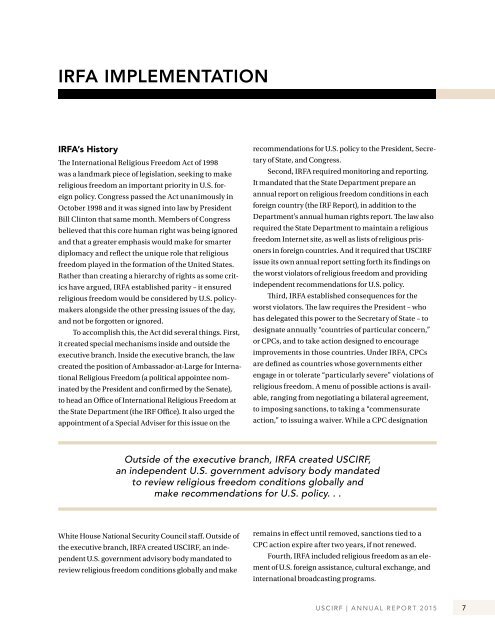USCIRF Annual Report 2015 (2)
USCIRF Annual Report 2015 (2)
USCIRF Annual Report 2015 (2)
Create successful ePaper yourself
Turn your PDF publications into a flip-book with our unique Google optimized e-Paper software.
IRFA IMPLEMENTATION<br />
IRFA’s History<br />
The International Religious Freedom Act of 1998<br />
was a landmark piece of legislation, seeking to make<br />
religious freedom an important priority in U.S. foreign<br />
policy. Congress passed the Act unanimously in<br />
October 1998 and it was signed into law by President<br />
Bill Clinton that same month. Members of Congress<br />
believed that this core human right was being ignored<br />
and that a greater emphasis would make for smarter<br />
diplomacy and reflect the unique role that religious<br />
freedom played in the formation of the United States.<br />
Rather than creating a hierarchy of rights as some critics<br />
have argued, IRFA established parity – it ensured<br />
religious freedom would be considered by U.S. policymakers<br />
alongside the other pressing issues of the day,<br />
and not be forgotten or ignored.<br />
To accomplish this, the Act did several things. First,<br />
it created special mechanisms inside and outside the<br />
executive branch. Inside the executive branch, the law<br />
created the position of Ambassador-at-Large for International<br />
Religious Freedom (a political appointee nominated<br />
by the President and confirmed by the Senate),<br />
to head an Office of International Religious Freedom at<br />
the State Department (the IRF Office). It also urged the<br />
appointment of a Special Adviser for this issue on the<br />
recommendations for U.S. policy to the President, Secretary<br />
of State, and Congress.<br />
Second, IRFA required monitoring and reporting.<br />
It mandated that the State Department prepare an<br />
annual report on religious freedom conditions in each<br />
foreign country (the IRF <strong>Report</strong>), in addition to the<br />
Department’s annual human rights report. The law also<br />
required the State Department to maintain a religious<br />
freedom Internet site, as well as lists of religious prisoners<br />
in foreign countries. And it required that <strong>USCIRF</strong><br />
issue its own annual report setting forth its findings on<br />
the worst violators of religious freedom and providing<br />
independent recommendations for U.S. policy.<br />
Third, IRFA established consequences for the<br />
worst violators. The law requires the President – who<br />
has delegated this power to the Secretary of State – to<br />
designate annually “countries of particular concern,”<br />
or CPCs, and to take action designed to encourage<br />
improvements in those countries. Under IRFA, CPCs<br />
are defined as countries whose governments either<br />
engage in or tolerate “particularly severe” violations of<br />
religious freedom. A menu of possible actions is available,<br />
ranging from negotiating a bilateral agreement,<br />
to imposing sanctions, to taking a “commensurate<br />
action,” to issuing a waiver. While a CPC designation<br />
Outside of the executive branch, IRFA created <strong>USCIRF</strong>,<br />
an independent U.S. government advisory body mandated<br />
to review religious freedom conditions globally and<br />
make recommendations for U.S. policy. . .<br />
White House National Security Council staff. Outside of<br />
the executive branch, IRFA created <strong>USCIRF</strong>, an independent<br />
U.S. government advisory body mandated to<br />
review religious freedom conditions globally and make<br />
remains in effect until removed, sanctions tied to a<br />
CPC action expire after two years, if not renewed.<br />
Fourth, IRFA included religious freedom as an element<br />
of U.S. foreign assistance, cultural exchange, and<br />
international broadcasting programs.<br />
<strong>USCIRF</strong> | ANNUAL REPORT <strong>2015</strong> 7


